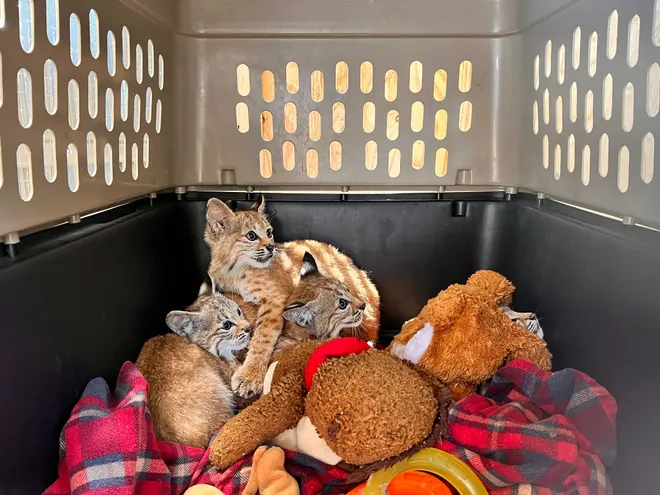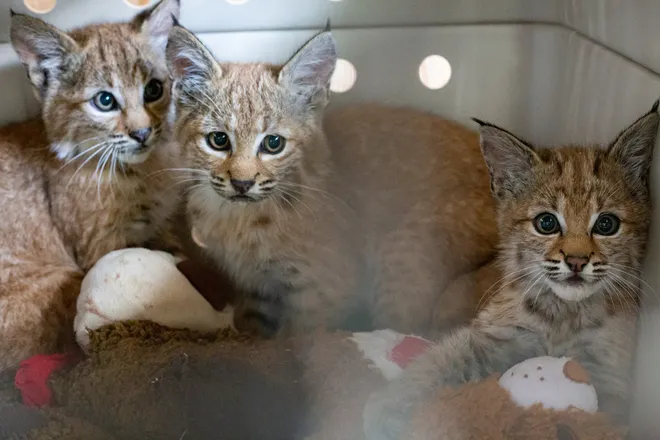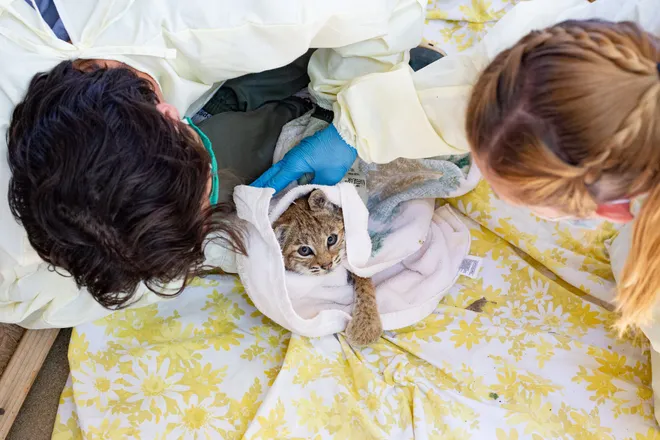Five orphaned bobcat kittens have found a home with a Colorado wildlife center

A Colorado animal rehabilitation center is now caring for five orphaned bobcat kittens after their mother was found dead last week.
Greenwood Wildlife Rehabilitation Center in Longmont received word from authorities in Louisville that all five bobcat siblings were spotted hanging out near someone’s backyard, according to the center’s Facebook page.
A lactating female bobcat was found dead on a nearby road soon after. Over the next couple of days, local animal control went to work on setting traps to catch the litter. With the help of the homeowner, three were caught and reunited.
A fourth bobcat was caught by a neighbor who spotted it in the tree, clinging to the trunk and shaking, weakened after being separated from its mother. Local authorities were able to coax the bobcat kitten out of the tree and bring it some comfort.
Animal Control Officers are still in search of the last kitten. They have asked that those in the area text (720) 722-3088 with sightings.
Greenwood Wildlife plans to release the kittens back into the wild as soon as they are able to fend for themselves.
More:Are bobcats dangerous? What to know about the cute, but wild, cats.
Where are bobcats most commonly found?

Bobcats, also known as Felis rufus typically span between 32-37 inches in length and have a six-inch tail. They are often large and pale in color, according to Colorado Parks & Wildlife.
They are commonly found in North America anywhere from southern Canada to central Mexico but can be found all across Colorado. Suitable habitats for bobcats include foothills, canyons, mesas, and plateaus because of the brush.
These stealthy predators eat their fair share of rabbits, but will also hunt for mice, voles and birds when rabbits run scarce.
Bobcats reproduce one single litter, usually late winter or spring under a rock or log. There are typically three bobcat kittens in a single litter.
What to do if you see a bobcat

It's important to remain cautious like you would with any other wild animal, but bobcats don't normally attack humans or initiate contact with people, according to AZ Animals.
They can be dangerous when they are startled or feel like they are in danger. Because these wild cats have an innate fear of humans, it's unlikely you will be attacked unprovoked.
The chance that you might encounter a bobcat is pretty low. They are rarely seen and pretty secretive in nature, but here are some tips in case you do:
- Do not approach the bobcat
- Do not turn your back on it. Instead, slowly back away from the bobcat
- No matter how tempting it may be, do not run as this can provoke the bobcat
- Throw any water you have at the bobcat. Like other cats, they do not like water
- Call animal control if you see a bobcat in a developed area
- Bang anything you have together or make as much noise as possible
Disclaimer: The copyright of this article belongs to the original author. Reposting this article is solely for the purpose of information dissemination and does not constitute any investment advice. If there is any infringement, please contact us immediately. We will make corrections or deletions as necessary. Thank you.





